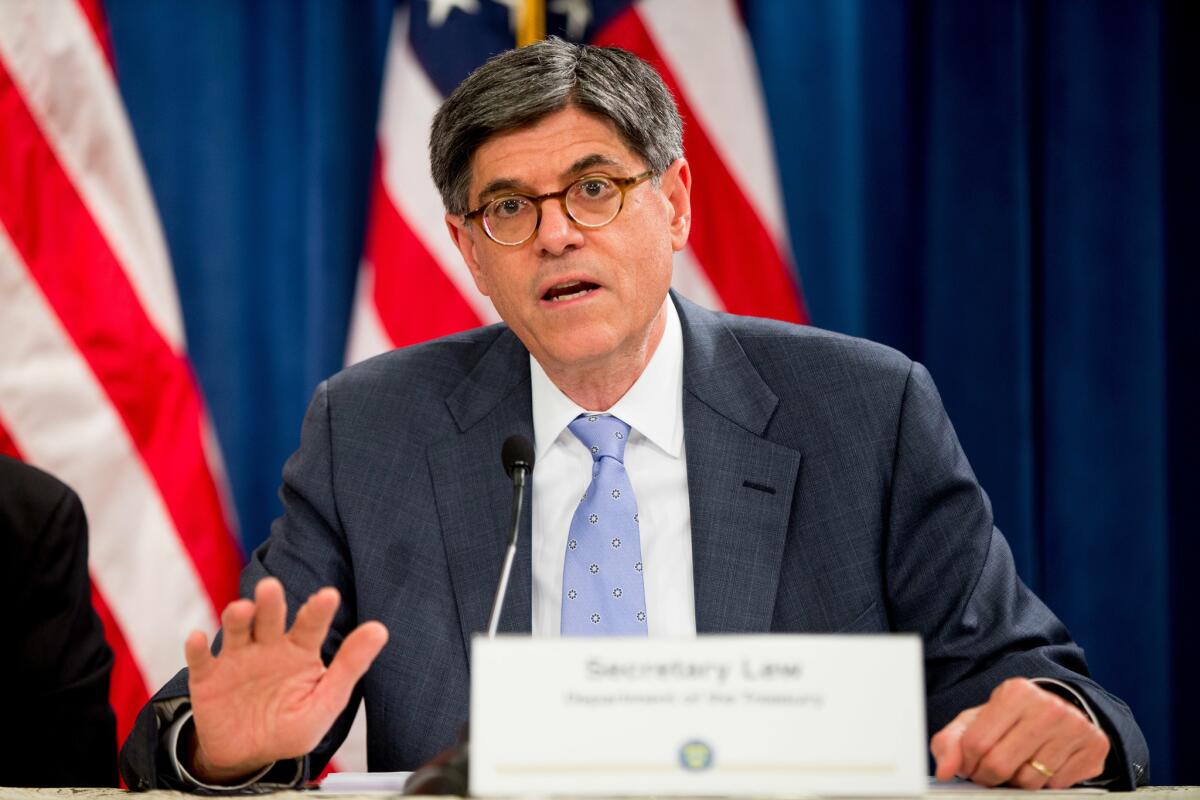U.S. markets fall and U.K. credit rating cut; no crisis, Treasury chief says

- Share via
Major U.S. stock indexes fell sharply again Monday and two leading companies cut Britain’s credit rating in the wake of last week’s vote to leave the European Union.
And although Treasury Secretary Jacob J. Lew acknowledged the “Brexit” was a headwind for the U.S. economy, he said it should not trigger another financial crisis.
“The U.S. economy is doing pretty well. It’s performing in a stable, steady way even though there have been substantial headwinds,” Lew told CNBC on Monday before an international financial conference in Washington.
“There’s no question that this is an additional headwind but it’s something we can manage through, and Europe and the U.K. can manage through,” Lew said. “There’s no sense of a financial crisis developing.”
The Dow Jones industrial average, which plummeted more than 600 points on Friday, was down 337 points at its low on Monday before recovering some of the losses. It closed down 260.51 points, or 1.5%, at 17,140.58. The broader Standard & Poor’s 500 index declined nearly 2%, and the technology-heavy Nasdaq composite fell about 2.4%.
Major European stock indexes declined about 2% Monday. That came after some Asian stock indexes rebounded Monday. Japan’s Nikkei index posted a 2.4% gain.
Analysts said the Brexit vote could push Britain into a recession and would be a big hit to European economic growth. That in turn would hurt the U.S. economy, but shouldn’t cause a recession here, economists said.
In another hit to the British economy, S&P Global Ratings said Monday it lowered the nation’s coveted AAA credit rating to AA because of the vote. The rating was lowered two notches and now is below the U.S. AA+ rating. A lower credit rating could increase the country’s cost of borrowing.
“In our opinion, this outcome is a seminal event, and will lead to a less predictable, stable, and effective policy framework in the U.K.,” S&P said.
Fitch Ratings also cut its British credit rating to AA from AAA. On Friday, Moody’s took a step toward cutting its Aa1 rating on British government debt.
Investors continued to seek the safe haven of U.S. government bonds Monday. The yield for benchmark 10-year U.S. Treasury bonds, which moves in the opposite direction of price, fell to 1.46%.
Meantime, the pound fell another 1.7% compared with the dollar, hitting a new 31-year low of $1.32.
Lew said he had spoken several times over the weekend with his counterparts in Europe and elsewhere in trying to help manage the fallout from the British vote, which rattled world financial markets.
In remarks prepared for the annual meeting of the Bretton Woods Committee on Monday, Lew said world financial leaders would continue to consult about the effect of the vote.
“We respect the decision of the voters in the U.K. and will work closely with London, Brussels and our international partners to ensure continued economic stability, security and prosperity in Europe and globally,” Lew said.
Although financial markets have fallen sharply in reaction to the Brexit vote, “there is an orderliness in the markets,” Lew told CNBC.
He urged people not to “overreact to a volatile day here and there.” Banks are in better shape to handle a shock than they were during the financial crisis in 2008, and world leaders are prepared to handle it, Lew said.
“There are the tools in place for policymakers to manage this,” he said.
The uncertainty probably will lead Federal Reserve policymakers to hold off on another interest rate hike when they meet next month.
It was hoped Fed Chairwoman Janet L. Yellen might signal the next interest rate move during a public appearance on a panel at a European Central Bank conference in Portugal on Wednesday. But Fed spokesman David Skidmore said Monday that Yellen no longer would participate.
Yellen plans to return to Washington following a conference in Switzerland, he said. Mark Carney, the head of the Bank of England, also has withdrawn from the policy panel.
Follow @JimPuzzanghera on Twitter
ALSO
The race is on to save Americans from their meager retirement savings
Uber is making surge pricing more transparent — but a little less obvious
Cost of keeping America safe from lone-wolf attackers shifts to businesses
UPDATES:
1:32 p.m.: This article was updated with details about the value of the pound to the dollar.
1:15 p.m.: This article was updated with closing U.S. stock index figures and news that Fitch Ratings cut the British credit rating.
11:10 a.m.: This article has been updated with news of Standard & Poor’s cutting the British credit rating and updated U.S. stock market figures.
6:59 a.m.: This article was updated with early trading figures from U.S. stock markets and information about Federal Reserve Chairwoman Janet L. Yellen withdrawing from a Wednesday public appearance.
6:37 a.m.: This article was updated with the opening of U.S. financial markets.
This article originally was published at 6:08 a.m.
More to Read
Inside the business of entertainment
The Wide Shot brings you news, analysis and insights on everything from streaming wars to production — and what it all means for the future.
You may occasionally receive promotional content from the Los Angeles Times.











